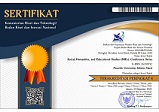Improving Learning Outcomes in Mathematics Subjects Through Problem Based Learning Learning Models
Abstract
The gap in student learning outcomes in the content of Mathematics lessons is caused by the lack of innovative learning models and the lack of relationships between learning materials and real life. The purpose of this study is to analyze the effect of the Problem Based Learning learning model on student learning outcomes in Mathematics lesson content at the elementary school level. Research is conducted through classroom action research methods in two cycles, each cycle consists of four stages: action planning, action execution, observation, and reflection. Each cycle involves pre-test and post-test stages to measure student progress in learning. The results showed that the application of the Problem Based Learning learning model can improve student learning outcomes in Mathematics lesson content. In the precycle stage, the average student score was 62 with learning completeness of 40% being in the low category. In cycle I, the average score of students increased to 67.5 which was included in the sufficient category, and in cycle II, there was an average increase to 78 with learning completeness of 92% which was included in the high category. Thus, the effective use of the Problem Based Learning learning model can help improve student learning outcomes in the content of Mathematics lessons at the elementary school level
Keywords
Learning outcomes, Problem Based Learning, Mathematics
Full Text:
PDFRefbacks
- There are currently no refbacks.





